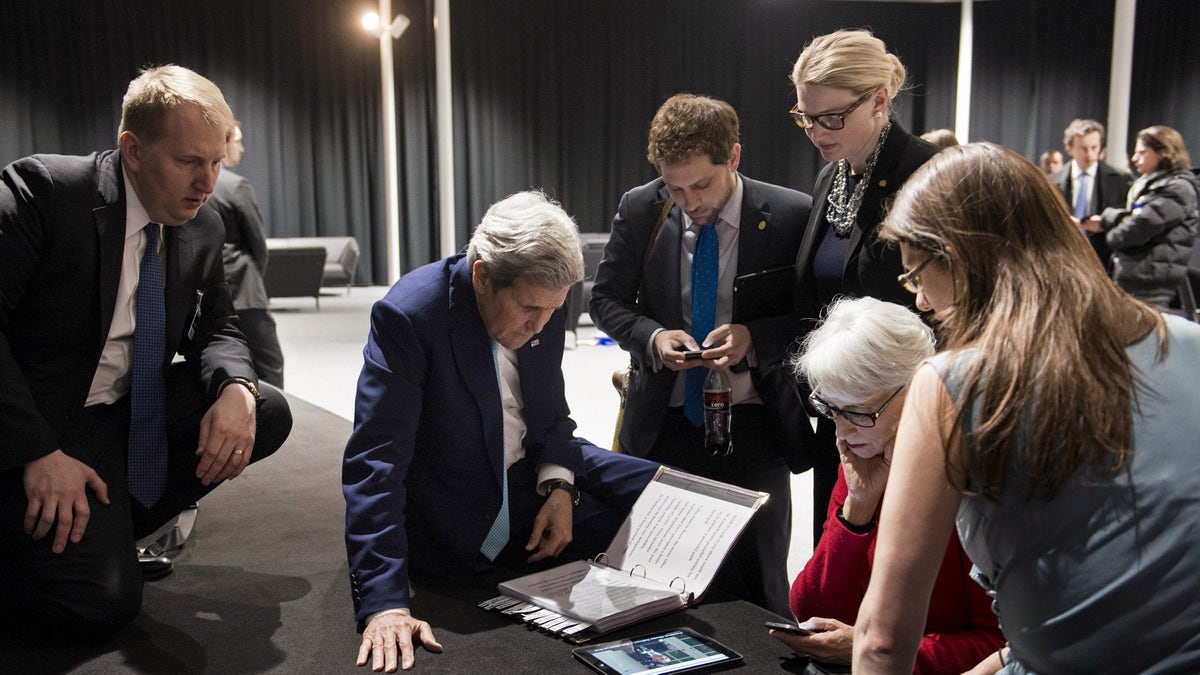
Cyber experts fear the deal being negotiated with Iran to ease sanctions in return for a pledge to drop pursuit of nuclear weapons could boost Iran's ability to wage cyber war. (REUTERS)
American historians know that the Revolutionary War effectively ended when British Lord Charles Cornwallis -- or more correctly Brigadier General Charles O’Hara, representing an allegedly ill Cornwallis -- formally surrendered to George Washington at the Battle of Yorktown in 1781.
Legend has it that when O’Hara presented Cornwallis’ sword to Washington, British drummers and fifers played the tune, "The World Turn'd Upside Down.”
Given all that President Obama and some allies plan on giving away in exchange for Iran’s brief pause of its nuclear ambitions, perhaps the United States Marine Band should dust off the “Upside Down” sheet music.
After all, the proposed deal is destined to keep Iran on a path to develop nuclear weapons, more energetically support terrorism, and modernize its conventional military forces. But it also – and perhaps most disturbingly – enables the regime to build Iran into a global cyber superpower.
How is it possible, that on the heels of the largest breach in the history of the U.S. government, in negotiating with a country whose Supreme Leader recently implored Iranian college students to become “cyber war agents,” that nothing in the nuclear pact addresses the goal of limiting Iran’s ability to conduct overt cyber warfare? Such an oversight is simply stunning in light of the massive breach at the Office of Personnel Management and all the attention the Obama administration has been trying to focus on the need to increase cyber security here in the United States.
From the devastation of 9/11 to the growing pains of the Department of Homeland Security, we know full well how difficult it is to suffer through a devastating tragedy while trying simultaneously to prevent a similar event from happening.
Consider this: with the $150 billion that soon will be freed up by the deal’s termination of sanctions, Iran will be able to go on a cyber arms shopping spree. Iran will quickly become the buyer of choice for hackers, and will build up the information technology infrastructure necessary to support and execute sophisticated and sustained cyber attacks across the globe.
None of this is speculation. Rather, it is the logical next step on the path of cyber destruction Iran has been blazing for years. Remember, it was just a few years ago that Iranian agents carried out a sustained campaign designed to paralyze the websites of American banks. The U.S. military also has seen some of its networks deeply penetrated by Iranian hackers. Even worse, it took the military several months to completely rid itself of those relative cyber-amateurs.
From the devastation of 9/11 to the growing pains of the Department of Homeland Security, we know full well how difficult it is to suffer through a devastating tragedy while trying simultaneously to prevent a similar event from happening.
With that searing experience still fresh in our minds, we cannot understand how this administration could make such a huge deposit into Iran's central bank for terrorism. In addition to supporting all those terrorist organizations in the Middle East, they can upgrade their cyber warfare capability -- and will.
When the ceremony that formalizes the Iran agreement takes place, perhaps administration leaders, taking a cue from Cornwallis, should call in sick. Because the world is not only turned upside down but, as of last Tuesday, became a much more dangerous place.
